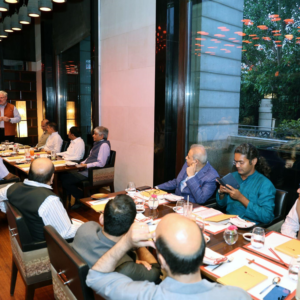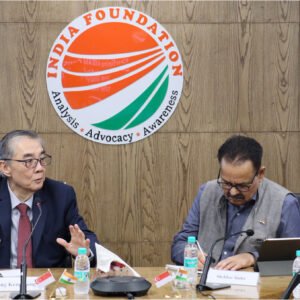From the very beginning, BRICS was one of the top priorities for the Russian foreign policy. The Association embodies the vision Russia believes in – BRICS promotes just and equal relationship and multifaceted mutually beneficial cooperation based on legitimate national interests, international law and the UN Charter. In BRICS, there is no place for a dictate, domination, unilateral and confrontational approaches, sanctions, weaponization of economy and currencies,
as well as interference in domestic affairs.
Even in the current geopolitical turbulence, BRICS is not aimed against anyone. It even does not confront the current international economic and financial institutions, rather it is designed to supplement them. In fact, it offers alternative instruments, which are supposed to be safe from politicized Western architecture,
including in the context of the de-dollarization trend.
In this sense, one of the most important achievements of BRICS is the New Development Bank as well as Contingent Currency Arrangement, which were launched in 2014. To date, the NDB’s loan portfolio includes 90 projects amounting to more than USD 30 bn. In order to diversify and expand its potential for the benefit of member-economies, it is going to increase the share of non-sovereign projects and to promote cooperation network with other multilateral and national development and commercial banks. We also welcome the NBD’s new shareholders Bangladesh, UAE, Egypt and Uruguay and expect more countries to come in.
The BRICS members have been taking consistent steps to switch
to settlements in national currencies for quite some time now and working out new payment mechanisms. Against this backdrop, the proposal of the Brazilian President Lula de Silva to think about the creation of a single BRICS currency sounded relevant. At the last year’s summit, the President of Russia Vladimir Putin spoke
about an international reserve currency based on the currency basket of the BRICS countries. These ideas demonstrate new tendencies, however it’s clear that a lot
of aspects around that require in-depth study. For instance, the creation of a single currency suggests the establishment of a single emission center and regulator as well as the synchronization of macroeconomic and monetary policy. On the other hand, a BRICS payment instrument based on the currency basket would help to carry out mutual settlements without any reliance on the US dollar. In any case, the issues
of building an effective independent settlement and payment infrastructure
are among the priorities of BRICS in the financial track. Consultations on that
are going on.
Traditionally, the BRICS agenda closely corresponds to the G20 priorities, including the need to consolidate the efforts and interests of emerging economies and empower the countries of the Global South. Hence, BRICS is a natural source of support of the current Indian Presidency in the G20. The growing potential
of BRICS combined with our likeminded vision for sustainable and predictable multipolarity is by itself a solid reason for us to move ahead towards real democratization of the global governance. That is why it has always been important
to maintain relevant coordination. Russia would favour to resume the pre-pandemic practice of regular meetings of BRICS leaders on the sidelines of the G20 Summits.
BRICS exemplifies a new formation, which can be called a flexible integration based on consensus and being truly comprehensive. More than
70 formats of practical cooperation are structured in the three pillars – policy and security, economy and finance as well as humanitarian ties. All that makes this Association even stronger than any agreement-based supranational Alliance or
a bloc. That means that we eagerly cooperate on those issues, which we have voluntarily agreed upon.
The Big Five partnership includes such critically important areas like counterterrorism, anti-corruption, healthcare, digitalization, science and technology, innovations, energy efficiency, food security, supply chains, customs, e-commerce and even space with the Remote Satellite Constellation Agreement is being implemented since 2022.
BRICS is capable to timely respond to the needs of member-states. During
the COVID-19 pandemic, the NDB launched the USD 10 bn support programme
to help the nations to overcome relevant social and economic consequences.
All the above aspects make BRICS very attractive for other countries, which do share the same values and principles and want to be part of equal and mutually beneficial cooperation. And it’s a high time to respond to such desire of at least more than 20 aspirants. The South African presidency’s endeavors in this regard deserve high appreciation. With over one third of the world’s GDP, a total population
of around 3 billion people and a strong desire of other states to join its activities,
it is safe to say that BRICS becomes an integral element of an evolving multipolar paradigm, and it is our collective responsibility to effectively address its potential. There is a big hope and expectations from the coming Summit in Johannesburg, which will bring together more than 60 countries with a view to consolidate
the global majority in solving common development issues, overcoming acute trade and economic imbalances and multiplying the areas of cooperation.
Russia as the next BRICS chair wholeheartedly supports the priorities set up by the South African presidency focusing on the extension of engagements with Africa, and wishes the Summit to be a historic success reflecting the traditional spirit of mutual respect, equality, solidarity, pragmatism and friendship.
Author Brief Bio: Mr. Roman Babushkin is the Minister-Counsellor, DCM, Embassy of the Russian Federation in India.
Note: This is the transcript of the Speech delivered by Mr. Roman Babushkin, Minister-Counsellor, DCM, Embassy of the Russian Federation in India, at the Roundtable discussion on “BRICS Expansion and Currencies” organised by India Foundation on 11 August 2023.




